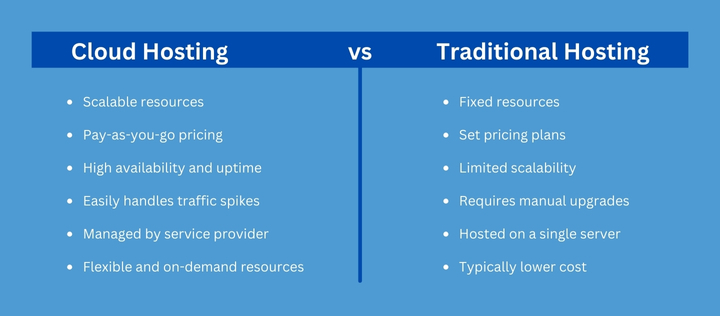What is Cloud Hosting? Benefits, Trends & Why It’s Popular
What is Cloud Hosting, and Why is it Becoming Popular? (A Complete Guide)
Nowadays, everyone is looking for dependable, flexible and affordable options online. This is where cloud hosting comes in handy. Cloud hosting is a new way of storing, managing, and accessing data. In this article, we will provide everything there is to know about cloud hosting, its features, utility, and even some of its technical workings.

What is Cloud Hosting?
In short, cloud hosting is a subdivision of web hosting that works by sharing the workload across multiple servers to maximize system uptime. “The cloud” is a network of not only one but multiple virtual servers; hence, hosting a website or an application on a singular physical server is no longer the case. This setup ensures the availability of backups in case of any failures.
Consider it as renting office space in a shared office building. Rather than owning the whole building (traditional hosting), you only pay for the space that you use, with the option to scale up or down as your business grows. Cloud hosting offers this kind of flexibility, which is one of the main reasons it’s fast becoming the desired option for businesses, both big and small.
How Does Cloud Hosting Work?
The services offered in cloud hosting are operated on a network of computers which means that, instead of using one computer, it uses multiple servers that are connected in a network.
1. Virtualization
A physical server is partitioned into smaller units known as virtual machines (VMs), using software such as VMware or Hyper-V.
2. Resource Pooling
VMs are pooled to form a collective resource environment.
3. Load Balancing
Servers are balanced so that the traffic for each one does not exceed a certain threshold, and the server maintains the highest performance.
4. Redundancy
One server takes over for another without data interruption should it fail, as the data is replicated across multiple servers.
Cloud architectures make it more reliable and easier to expand system resources, such as adding more storage or bandwidth, is required. Just modify your plan, and the new resources are added immediately.
Cloud Hosting vs Traditional Hosting: What’s the Difference?

The variations between traditional hosting and cloud hosting are notable. With traditional hosting, a single server is leased, which may cause problems if the server goes down. Cloud hosting allocates resources over many servers, which allows for enhanced performance and uptime.
Here’s a quick comparison
| Feature | Cloud Hosting | Traditional Hosting |
| Scalability | Easily scalable | Limited scalability |
| Cost | Pay-as-you-go model | Fixed pricing |
| Uptime | High uptime (99.9% or more) | Dependent on a single server |
| Performance | Consistent and reliable | Can slow down during traffic spikes |
| Security | Advanced security measures | Basic security features |
Benefits of Cloud Hosting
Cloud hosting isn’t just a fleeting development – it marks the shifting requirements for adaptive, dependable, and affordable hosting services. Below are some benefits of cloud hosting.
1. Scalability
Cloud hosting can adjust resources according to the requirements of a small blog or a large e-commerce store.
2. Cost-Effectiveness
Small businesses and startups can benefit from the pay-per-use model where they are billed only for the resources they utilize, making it a cost-effective service.
3. High Uptime
Your website will always be available thanks to the unrivalled uptime provided by cloud hosting’s distributed architecture. This uptime reliability allows for unparalleled uptime.
4. Enhanced Security
Cloud hosting providers often include regular backup, encryption, firewalls, and additional sophisticated security provisions.
5. Disaster Recovery
Data is safe and accessible because it is replicated in several servers, ensuring maximum security.
Why is Cloud Hosting Becoming Popular?
Several elements work hand in hand with the rise of cloud-hosting services
1. Business Shift
Companies expanding their online presence require digital hosting services that can meet their changing requirements.
2. Flexible Work
Remote work has widened the scope of trust and dependency on cloud tools and applications.
3. New Developments
Advancements in AI, IoT and big data require more agile and adaptive hosting structures.
4. Expenditure
The cost of cloud hosting is appealing to flexible small businesses and new entrepreneurs.
The value of the global cloud hosting market is projected to increase with a CAGR of 18.3% from 2023 to 2030, according to new statistics. This proves the increased acceptance of cloud hosting services in different sectors.
Use Cases of Cloud Hosting
Not only the tech companies, but it is also being adopted by personal users and people from businesses across different industries. Some notable use cases are listed below.

SB’s
Small websites and applications have a scalable hosting option, which is cost-effective.
E-Commerce
Capable of managing visitor surges during sales and advertisements. App Development: Cloud service is easy to connect to application programming interfaces and software development toolkits.
Education
Provides safe hosting for sharing educational materials.
Healthcare
Provides a safe environment to access as well as control confidential information about patients.
Limitations of Cloud Hosting
While there are amazing benefits of cloud hosting, it does come with its downsides. Here are just some of the drawbacks to think about
1. Increased Spending
If not monitored, pay-as-you-go pricing models can quickly result in unexpected spending.
2. Administrative Difficulty
The majority of service providers do provide managed services; however, some technical knowledge is required for managing cloud hosting.
3. Risk of Data Breaches
Cloud hosting is indeed secure, but it is still subject to cyber-attacks. It is very important to pick a well-known provider.
How to Choose a Cloud Hosting Provider
If you plan to change to cloud hosting, here’s what you should consider from the service provider
1. Security Features
Find out the provider’s willingness to provide encryption, firewalls, and automated data backups.
2. Pricing
Make sure to analyze the subscription payment plans so that you choose the appropriate price for your budget.
3. Emergency Response
Ensure the availability of the service team at any time throughout the day.
4. Uptime Guarantees
Providers should promise to offer or guarantee at least 99.9% of server uptime.
5. Growth
Make sure the provider is able to aid business enhancement and expansion in terms of equipment to be added.
Future Trends in Cloud Hosting
The development of cloud hosting follows the growth and advancement of technology. Some emerging trends include.

1. AI and Machine Learning
AI and machine learning will greatly depend on cloud hosting services.
2. Integration of Internet of Things (IoT)
The advancement of IoT devices will require more cloud hosting supporting services.
3. Multi-Cloud Approach
Companies will integrate multi-cloud and hybrid clouds into their systems for improved adaptability.
Conclusion
Cloud hosting is not just a buzzword but rather a solution that turns everything around about web hosting. With all its features, like being easily scalable, cost-effective, and very reliable, it is no surprise businesses, both big and small, are considering cloud hosting. Cloud hosting has the flexibility and performance for blogs and e-commerce sites to survive and succeed in cloud hosting’s modern era. Are you thinking about switching as well? Search for suitable providers and take your cloud hosting needs into consideration. Join the trend and make the switch to hosting in the cloud!
FAQs
Is cloud hosting secure?
Yes, cloud hosting is generally secure, especially when you choose a reputable provider with advanced security measures.
How much does cloud hosting cost?
Costs vary depending on your usage and provider, but cloud hosting typically follows a pay-as-you-go model.
Can I switch to cloud hosting from traditional hosting?
Absolutely! Many providers offer migration services to help you make the switch seamlessly.
What are the disadvantages of cloud hosting?
Potential drawbacks include cost overruns, technical complexity, and security concerns.
Which industries benefit most from cloud hosting?
Industries like e-commerce, healthcare, education, and app development see significant benefits from cloud hosting.







